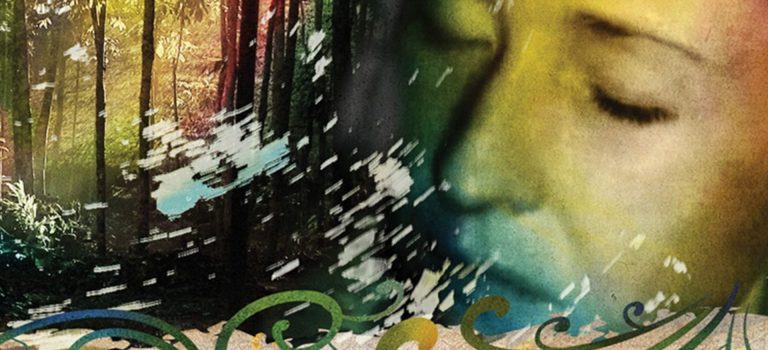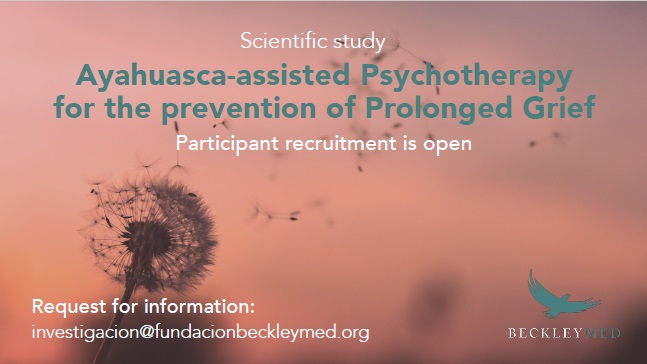
Could Ayahuasca Be the Best Grief Counsellor?

During the Covid-19 pandemic, millions of people have lost a loved one. In addition, many of them have not even been able to say goodbye or hold funerals, given the restrictions imposed by the health authorities to stop the transmission of the virus. In these circumstances, the prevalence of complicated and unresolved grief is incalculable and may become chronic in the long term.
An innovative study, led by psychologist Débora González and promoted by the Fundación Beckley Med – the Spanish branch of the Beckley Foundation – proposes ayahuasca as a vehicle for accessing a deeply meaningful inner world, and integrating this new information during the psychotherapy process.
The study will involve 216 participants divided into three groups of 72 people. The experimental group will receive nine sessions of individual and online therapy, using a constructivist approach, which characterises grief as a process of reconstructing a world that has been shattered by loss. Throughout the psychotherapeutic process, participants will be able to attend two ayahuasca ceremonies that will be performed together with other study participants.
The second group is a control group in which participants will only receive the nine psychotherapy sessions. After the nine-week follow-up period, they can voluntarily attend two ayahuasca ceremonies.
Finally, there is the ‘waiting list group’, which will only be evaluated during the baseline condition and nine weeks afterwards. Like the participants in the control group, those who wish to attend two ayahuasca ceremonies will be able to do so at the end of the follow-up period. All those who attend the ceremonies will have a group preparation session before the ceremonies, and an individual integration session afterwards. In order to be eligible for participation, participants must have lost a first-degree relative in the last twelve months. If this is the case, and you would like to participate in the study, you can contact Beckley Med via email: investigacion@bmed.org.es
The use of ayahuasca to help the mourning process at a therapeutic level is not new. Débora González has been studying this issue for years, and at the last World Aya Conference, she discussed some of her conclusions in her presentation, ‘Ayahuasca, therapy and grief’.
As Dr. González explains, “when faced with the death of the people we love, we are inevitably confronted with the philosophical and existential questions that have accompanied man throughout his history, those questions that only one can answer for oneself. Ayahuasca helps us to delve deeper into our memories and collective imagination, allowing us to assimilate information that is inaccessible during our usual waking state. This new information is very enriching to reconstruct a meaningful world through the process of constructivist therapy, making the benefits of ayahuasca and psychotherapy synergistically enhanced. In addition, ayahuasca facilitates contact with that spiritual dimension of the human being that has been diminished in our current society, due to the tragic ravages of religion over the centuries and our dualistic, individualistic and deeply materialistic worldview. When we face death, we face mystery, and ayahuasca helps us to walk the mystery”.
Why ayahuasca to adapt to the world after the death of a loved one? “Ayahuasca is a Quechua term derived from the juxtaposition of the terms “Aya“, meaning death, soul, spirit or ancestor and “waska” meaning vine or liana, translating as “vine of the dead“. It is therefore possible that ayahuasca has been used for this purpose (among many others) for hundreds of years by Amazonian indigenous communities. We have conducted some previous studies where we have seen that ayahuasca evokes experiences that directly touch on the key issues of grief processes in those who have lost a loved one. For example, emotional unblocking in cases of denial; access to significant biographical memories that are understood from another point of view; or contact with the “essence” of the deceased, which facilitates the resolution of pending issues, such as asking for forgiveness or saying goodbye to the loved one.
Ayahuasca experiences can bring with them benefits of great therapeutic value since certain psychological processes, such as self-forgiveness, are really difficult to achieve with the usual psychotherapy techniques. In this case, it is as if ayahuasca becomes the therapist, playing the necessary keys for the readjustment of the mourner, in an intimate, unique and natural way”, answers Dr. González.

Have you lost a loved one and would like to be part of the Beckley Med Foundation study? Write to investigacion@bmed.org.es for more information
Podcast
- All
Links
- All
Support
- All
BIPRP
- All
Science Talk
- All
Amanda's Talks
- All
- Video Talk
- Featured
- 2016 Onwards
- 2011-2015
- 2010 and Earlier
- Science Talk
- Policy Talk
One-pager
- All
Music
- All
Amanda Feilding
- All
Events
- All
Highlights
- All
Psilocybin for Depression
- All
Current
- All
Category
- All
- Science
- Policy
- Culture
Substance/Method
- All
- Opiates
- Novel Psychoactive Substances
- Meditation
- Trepanation
- LSD
- Psilocybin
- Cannabis/cannabinoids
- Ayahuasca/DMT
- Coca/Cocaine
- MDMA
Collaboration
- All
- Beckley/Brazil Research Programme
- Beckley/Maastricht Research Programme
- Exeter University
- ICEERS
- Beckley/Sant Pau Research Programme
- University College London
- New York University
- Cardiff University
- Madrid Computense University
- Ethnobotanicals Research Programme
- Freiburg University
- Medical Office for Psychiatry and Psychotherapy, Solothurn
- Beckley/Sechenov Institute Research programme
- Hannover Medical School
- Beckley/Imperial Research Programme
- King's College London
- Johns Hopkins University
Clinical Application
- All
- Depression
- Addictions
- Anxiety
- Psychosis
- PTSD
- Cancer
- Cluster Headaches
Policy Focus
- All
- Policy Reports
- Advisory Work
- Seminar Series
- Advocacy/Campaigns
Type of publication
- All
- Original research
- Report
- Review
- Opinion/Correspondence
- Book
- Book chapter
- Conference abstract
- Petition/campaign
Search type